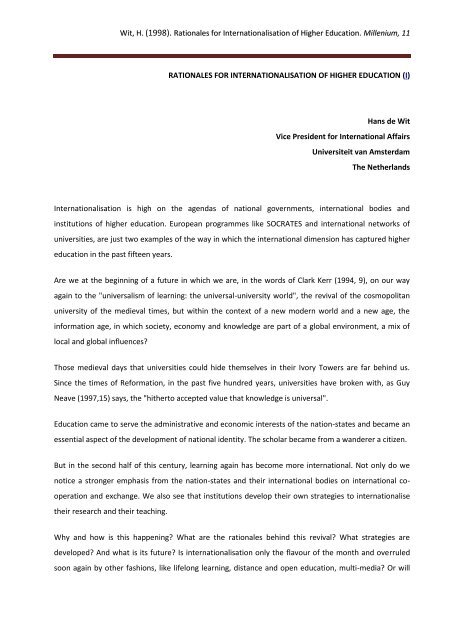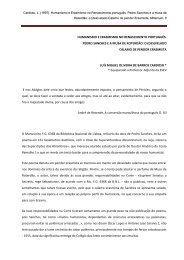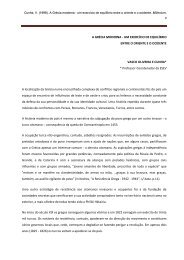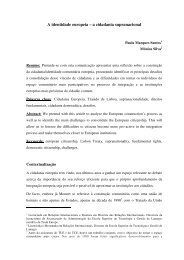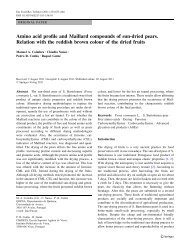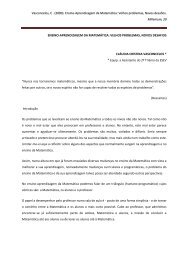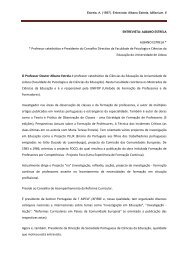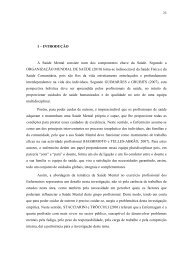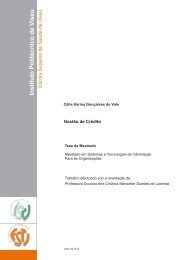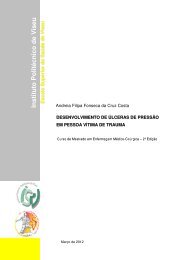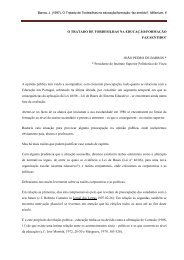Rationales for Internationalisation.pdf
Rationales for Internationalisation.pdf
Rationales for Internationalisation.pdf
You also want an ePaper? Increase the reach of your titles
YUMPU automatically turns print PDFs into web optimized ePapers that Google loves.
Wit, H. (1998). <strong>Rationales</strong> <strong>for</strong> <strong>Internationalisation</strong> of Higher Education. Millenium, 11RATIONALES FOR INTERNATIONALISATION OF HIGHER EDUCATION (I)Hans de WitVice President <strong>for</strong> International AffairsUniversiteit van AmsterdamThe Netherlands<strong>Internationalisation</strong> is high on the agendas of national governments, international bodies andinstitutions of higher education. European programmes like SOCRATES and international networks ofuniversities, are just two examples of the way in which the international dimension has captured highereducation in the past fifteen years.Are we at the beginning of a future in which we are, in the words of Clark Kerr (1994, 9), on our wayagain to the "universalism of learning: the universal-university world", the revival of the cosmopolitanuniversity of the medieval times, but within the context of a new modern world and a new age, thein<strong>for</strong>mation age, in which society, economy and knowledge are part of a global environment, a mix oflocal and global influences?Those medieval days that universities could hide themselves in their Ivory Towers are far behind us.Since the times of Re<strong>for</strong>mation, in the past five hundred years, universities have broken with, as GuyNeave (1997,15) says, the "hitherto accepted value that knowledge is universal".Education came to serve the administrative and economic interests of the nation-states and became anessential aspect of the development of national identity. The scholar became from a wanderer a citizen.But in the second half of this century, learning again has become more international. Not only do wenotice a stronger emphasis from the nation-states and their international bodies on international cooperationand exchange. We also see that institutions develop their own strategies to internationalisetheir research and their teaching.Why and how is this happening? What are the rationales behind this revival? What strategies aredeveloped? And what is its future? Is internationalisation only the flavour of the month and overruledsoon again by other fashions, like lifelong learning, distance and open education, multi-media? Or will
Wit, H. (1998). <strong>Rationales</strong> <strong>for</strong> <strong>Internationalisation</strong> of Higher Education. Millenium, 11internationalisation stabilise itself as an integral part of higher education policies? And isinternationalisation the solution to all our present problems of a multicultural and international society?Are we absolutely convinced that internationalisation will bring the local and the global into perfectharmony, or should we limit our optimism and see internationalisation only as one of the many ways inwhich multiculturalism, peace and mutual understanding can be tried to overcome?1. MeaningWhat do we mean with internationalisation of higher education? It would be going too far to presentand discuss here the many different definitions, terms and approaches to internationalisation present inliterature and higher education practice. In the course of a comparative study, Jane Knight of RyersonPolytechnic University in Toronto, Canada, and I have been working on <strong>for</strong> the Programme onInstitutional Management of Higher Education (IMHE) of the Organisation <strong>for</strong> Economic Co-operationand Development (OECD), we have come to the following working definition: "<strong>Internationalisation</strong> ofhigher education is the process of integrating an international/intercultural dimension into the teaching,research and service functions of the institution." (1997, 8)As you will notice from this definition, it includes several important elements:internationalisation is a processinternationalisation is a response to the international , to globalisation and is not to be confusedwith the globalisation process itselfinternationalisation includes both international and local elements (intercultural).This way of looking to and defining of internationalisation of higher education is quite different thanwhat frequently is done in studies dealing with this theme. In most studies internationalisation of highereducation is narrowed to one or a few activities, academic mobility, global or multicultural education,area studies, study abroad, etcetera.In these and other studies internationalisation is confused with a rationale: a political one, like peaceand mutual understanding, or an economic one, like the needs of a more and more international labourmarket, etcetera.And most of the studies ignore the link between international and local, between studying in aninternational environment and the fact that that environment includes the local environment.
Wit, H. (1998). <strong>Rationales</strong> <strong>for</strong> <strong>Internationalisation</strong> of Higher Education. Millenium, 11Such studies see internationalisation not as a process but as an activity with a beginning and with anend.That is why, quite confusing, the term international education is so often used in exchange withinternationalisation of higher education and its different activities and approaches.International Education assumes that education already has become international, I would dare to say-we are only in a process of internationalising and the end, being international, is remote and difficult todefine.(II)2. <strong>Rationales</strong>Why are institutions of higher education, national governments , international bodies and more andmore the private sector -banks, industry, foundations- so actively involved in international educativeactivities? There is not one single answer to that question, as is often thought.In the study Jane Knight and I did <strong>for</strong> OECD, we distinguish four groups of rationales: academic,social/cultural, political and economic rationales (1995, 9-14). <strong>Rationales</strong> can be described asmotivations <strong>for</strong> integrating an international dimension into higher education. They address the "why" ofinternationalisation. And different rationales imply different means and ends to internationalisation.When analysing rationales, we have to take into account the diversity of stakeholders’ groups in highereducation: the government sector, the private sector and the educational sector. And within the lastgroup we have to distinguish between three subgroups: the institutional level, the academics and theirdepartments, and the students.It is important to keep in mind that:a. there is a strong overlap in rationales within and between different stakeholders’ groups; themain differences are in the hierarchy of priorities;b. in general, stakeholders do not have one exclusive rationale but a combination of rationales <strong>for</strong>internationalisation with a hierarchy in priorities;c. rationales may differ between stakeholders’ groups and within stakeholders’ groups;d. priorities in rationales may change over time and may change by country and region;e. rationales are in general more implicit than explicit motives <strong>for</strong> internationalisation.
Wit, H. (1998). <strong>Rationales</strong> <strong>for</strong> <strong>Internationalisation</strong> of Higher Education. Millenium, 113. Historical development of rationales’ dominanceIn the course of the history of higher education, in European medieval times and in the Arab universityworld even be<strong>for</strong>e, academic and social/cultural rationales were dominant: the wandering scholarlooking <strong>for</strong> knowledge and understanding of other cultures.These rationales, although less dominant now, have always been and still are present in highereducation.But later, during the process of the development of the nation-state and its colonial expansion, politicalrationales became more and more present. By copying the European models of higher education in thecolonies in the Americas, Africa and Asia, the European nations were looking <strong>for</strong> political, cultural,economic and academic dominance, of which most nations and their universities are still trying toescape.With the rise of political and economic influence of the United States of America as an internationalpower in this century, and in particular after the Second World War, this political rationale got a newdimension. To maintain and expand its influence, knowledge of other cultures, languages and systems,became of crucial importance.Universities in the United States were stimulated with federal funding, mainly from budgets of The SateDepartment and the Defence Department, to develop area studies, <strong>for</strong>eign language training and studyabroad.Although seen in the rest of the world by many as a sign of American imperialism -matched by a similartrend in the <strong>for</strong>mer Soviet Union-, it was presented as a stimulus of peace and mutual understanding.Quotes of senators and presidents of the post war period make that clear.Senator Fulbright spoke of educational exchange as, "from the standpoint of future world peace andorder, probably the most important and potentially rewarding of our <strong>for</strong>eign policy activities."And he was followed by others such as president George Bush, saying in 1989 still: "Internationalexchanges are not a great tide to sweep away all difference. But they will slowly wear away obstacles topeace as surely as water wears away a hard stone."
Wit, H. (1998). <strong>Rationales</strong> <strong>for</strong> <strong>Internationalisation</strong> of Higher Education. Millenium, 11This optimistic view on international education as a way of peace making <strong>for</strong>ce, has been dominant inAmerican politics and higher education in the past fifty years, still is rather wide spread there and hasfound supporters elsewhere. For instance, the present policy statement of the International Associationof University Presidents speaks of "promoting vigorously the internationalisation of their institutionsand the global competence and literacy of their students as being essential to the long term pursuit of amore peaceful world where international understanding and co-operation in solving problems will beincreasingly critical <strong>for</strong> the quality of life and sustained economic, social and cultural development."Although it is quite tempting to sympathise with such a view of internationalisation of higher education,one, in my view, should be careful with such a pure political rationale <strong>for</strong> internationalisation. Who’speace is it and who’s understanding of the world? Was and is higher education in the rest of the world inthe position to place its understanding on equal terms with that of the American and Europeanacademic world? Does such a view provide space <strong>for</strong> an own national identity?In our comparative study of internationalisation strategies in Asia Pacific countries, Jane Knight and I didfind as one of the most clear rationales <strong>for</strong> internationalisation of higher education, not so much globalidentity but national identity. (1997, 23-27) By becoming part of a global environment on more equalterms, higher education and society can move away from dependency and dominance of westerntechnology, western means and languages of instruction. Not <strong>for</strong> instance the expansion of English aslanguage of instruction -an issue in several European continental higher education institutions-, but theoption of local languages of instruction -in replacement of the colonial, mainly English language, aheritage from the past, is an international strategic issue in several Asian countries and universities.This local or national impact of internationalisation seems to have become overshadowed in Europe andthe United States, where globalisation and uni<strong>for</strong>mity seem more dominant. Still, already in 1952, theCzech born political scientist Karl Wolfgang Deutsch wrote, at Harvard: "there is an excellent changethat among the hundreds and thousands of <strong>for</strong>eign students at the universities today there may be aconsiderable number of young men and women who may go back one day to their countries with adeeper emotional attachment to their own nation and often with a deeper nationalism than the onewith which they came".Many national leaders have had their education abroad, and, in that other cultural environment,became more attached to their own national identity than be<strong>for</strong>e. International education is not only aconfrontation with the other but also, and maybe even more, with the own culture.
Wit, H. (1998). <strong>Rationales</strong> <strong>for</strong> <strong>Internationalisation</strong> of Higher Education. Millenium, 11For international education, is true what Mark Twain said about travel, namely "that it is fatal toprejudice, bigotry, and narrow mindedness", and what Paul Theroux wrote: "Being mistaken is theessence of the travellers tale." But where most studies indicate that students studying abroad did notchange much in their attitude on their host country, there are clear indications that overcomingmistakes and prejudices of the own culture are as much important effects as overcoming those of othercultures.I always remember clearly from my own time as a student in Lima, Peru, that Peruvian students fromlower income groups who had studied with a scholarship in the <strong>for</strong>mer Soviet Union were said to havecome back as convinced capitalists, and students from rich families who had studied in the United Statesas the leaders of the radical left. So, they were impacted on a quite opposite way than intended by theirhost countries, and returned with a different impact than their sponsors -respectively the at that timeleft wing military regime, and the conservative oligarchy, had hoped <strong>for</strong>.(III)From these examples, I hope it will be clear that the political rationale not always - and I would even beinclined to say, seldom- ends with the results intended by the donor and/or the receiver.I have given so much attention to the political rationale, because it has been so dominant in post secondworld war initiatives to internationalise higher education. But after the end of the cold war, theemphasis has changed from the political to the economic.The economic rationale was and still is the driving <strong>for</strong>ce behind the European programmes <strong>for</strong>cooperation and exchange in research, technology and education such as the Research andDevelopment Programmes, COMETT and ERASMUS, although always -and today even more than tenyears ago- combined with the political rationale to stimulate the development of a European citizenship.This change from the political to the economic, is clearly demonstrated in a recent study on "NationalPolicies <strong>for</strong> the <strong>Internationalisation</strong> of Higher Education in Europe", by the Swedish National Agency <strong>for</strong>Higher Education (1997). All the reports on the Northern European countries: the Scandinaviancountries, Austria, Germany, the U.K. and The Netherlands, but also on Central and Eastern Europe,indicate a tendency from the educational, cultural and political to the economic as dominant rationale<strong>for</strong> internationalisation. The only exception was from Southern Europe, Greece, an indication that inthat region higher education is still more driven by traditional rationales: academic, cultural andpolitical.
Wit, H. (1998). <strong>Rationales</strong> <strong>for</strong> <strong>Internationalisation</strong> of Higher Education. Millenium, 11The economic rationale is expressed in several ways, such as:the emphasis on internationalisation because of the requirements of the modern, more globallabour <strong>for</strong>ce needed;joint international Research and Development projects to compete internationally in newtechnology;more attention to marketing of higher education on the international market: higher educationas an export commodity, etcetera.These economic rationales <strong>for</strong> internationalisation have an impact on the local context.For instance, in business education, international business seems to become the main curriculum ofbusiness schools, responding to this supposed need <strong>for</strong> an international labour <strong>for</strong>ce. That, even in amore and more global economy, the large majority of the labour <strong>for</strong>ce will still be working in a localcontext, tends to become sometimes <strong>for</strong>gotten.In the emphasis on Research and Development, research oriented to social, cultural and local issues is indanger to get less priority and opportunity.And the growing competition <strong>for</strong> international students may have a negative impact both on the qualityof the education -by lower selection standards- and on the basic finance of higher education institutions<strong>for</strong> the training of local students, as institutions are more and more based on funding resulting fromrecruitment of <strong>for</strong>eign students, what has to take place on a vulnerable international market, as thefinancial crisis in Asia has made so clear recently.(IV)The political and in particular economic rationales that push at present institutions of higher educationto become more international are mainly external factors.That does not mean that universities have no incentive from inside to become more international. Theacademic environment itself has changed radically in the past fifty years. Higher Education has becomemore deregulated, diverse in income sources, privatised and market oriented. The entrepreneurialuniversity of these days feels an inside need to become again more international. The academicrationale, in addition to the traditional search <strong>for</strong> universal knowledge and understanding, has becomemore modern.
Wit, H. (1998). <strong>Rationales</strong> <strong>for</strong> <strong>Internationalisation</strong> of Higher Education. Millenium, 11More emphasis on professional education, on continuous education, on new areas such asenvironmental studies, in<strong>for</strong>mation science, etc. require a comparative and international dimension,coming from outside, but also from demands of faculty and students. This will be a driving <strong>for</strong>ce <strong>for</strong>internationalisation that will be as important as the external factor.ReferencesKerr, Clark, "Higher Education Cannot Escape History, Issues <strong>for</strong> the Twenty-First Century", StateUniversity of New York Press, 1994Deutsch, Karl W., "Nationalistic responses to Study Abroad", article reprinted in the InternationalSpectator, NAFSA, Washington D.C., Volume 6, number 3, Spring 1997Knight, Jane and Hans de Wit, "<strong>Internationalisation</strong> of Higher Education in Asia Pacific Countries", EAIE,Amsterdam, 1997Neave, Guy, "The European Dimension in Higher Education, an historical analysis", BackgroundConference Document, Enschede, April 7-9, 1997Wit, de Hans, "Strategies <strong>for</strong> <strong>Internationalisation</strong> of higher Education, a Comparative Study of Australia,Canada, Europe and the United States of America", EAIE, Amsterdam 1995________I - This article is partly based on an address at the conference "The International Universities: Global andLocal roles", April 3-5, 1998, Richmond, the American International University in London.II - The term international education has become so common, that it is not easy to avoid it, and also Iuse it frequently as an alternative <strong>for</strong> internationalisation of higher education, such as in the Journal ofStudies in International Education, I am the editor of, and in the name of the European Association ofInternational Education, I was co-founder of.III - This also shows that rationales <strong>for</strong> and perspectives on internationalisation may differ bystakeholders.IV - These critical observations to the economic rationales <strong>for</strong> internationalisation of higher education,so dominant at the moment, do not imply a plea against these economic rationales, they are onlypresented as concerns to take into account when internationalisation strategies are developed on thebasis of economic rationales.


